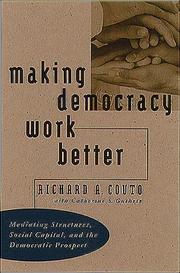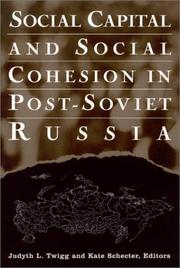| Listing 1 - 10 of 283 | << page >> |
Sort by
|
Book
Year: 2022 Publisher: Milano : Franco Angeli,
Abstract | Keywords | Export | Availability | Bookmark
 Loading...
Loading...Choose an application
- Reference Manager
- EndNote
- RefWorks (Direct export to RefWorks)
"It's all in the game" è il nome di una scommessa, quella tra un docente, due ricercatrici e studenti e studentesse del corso di Sociologia delle comunità e dei quartieri urbani dell'Università di Bologna. Nel 2020, infatti, un "esperimento didattico" ha dato vita a un lungo lavoro laboratoriale sull'analisi della serie tv americana The Wire, ambientata in un ghetto di Baltimora. Un'analisi realizzata adottando le lenti della sociologia urbana e dei neighbouhood studies in particolare, ma non solo. Un'analisi che voleva mettere alla prova le tecniche di indagine tipiche dell'etnografia urbana, utilizzando la serie come un vero e proprio campo in cui realizzare il fieldwork. The Wire, infatti, offre un campo interessante ed empiricamente analizzabile su temi come il capitale sociale, la cultura della povertà e del ghetto, il rapporto tra agency individuale e structural forces. I temi trattati nelle cinque stagioni hanno una chiara significatività sociologica che, in virtù di una contestualizzazione nella città di Baltimora, si fa urbana, dal momento che viene privilegiata una rappresentazione della complessità intrinseca e delle dinamiche multifattoriali che caratterizzano le povertà e le diseguaglianze in cui the space matter. Il volume è l'esito di un esperimento con un preciso obiettivo: creare un laboratorio che sapesse essere spazio di analisi critica, non fermandosi alla lettura dei fenomeni sociali urbani proposta dalla serie, ma collocandola nel panorama del dibattito accademico che si è sviluppato sulle diverse tematiche che emergevano anche nella serie. Dunque non un manuale scientifico sulla vita nelle inner cities, ma piuttosto la concretizzazione di un processo di analisi e apprendimento che ha riguardato tanto studenti e studentesse quanto i e le docenti ...
Book
Year: 2007 Publisher: Göttingen, Germany : Universitätsverlag Göttingen,
Abstract | Keywords | Export | Availability | Bookmark
 Loading...
Loading...Choose an application
- Reference Manager
- EndNote
- RefWorks (Direct export to RefWorks)
The term "social capital" has become a buzzword with a huge, already diffuse spectrum of application. This should give reason for conceptual and theoretical vigilance. What - in concrete - is the object when "social capital" is mentioned? This question has not been systematically dealt with and even less responsed in a satisfactory degree, although there are many contributions to the discussion of the term. The problem is labelled in the social sciences, but has not been resolved in the context of the specific social-scientific framework. This book takes the neglected metalinguistic perspective. Thus it advances the scientific maturity of the "social capital" debate and contributes to the establishment of a well-founded system in social science terms. It brings up social capital by combining an epistemological and ontological analysis and thus finally develops clarification of the concept. Die Debatte um Sozialkapital ist seit geraumer Zeit in Wissenschaft, Wirtschaft und Politik in Mode. Schaut man sich Untersuchungen dazu an, so scheint Sozialkapital für nahezu alles gut zu sein: sei es die Erhöhung des persönlichen Wohlbefindens, die Revitalisierung benachteiligter Stadtquartiere oder die Stärkung der Volkswirtschaft im globalisierten Standortwettbewerb - je mehr Sozialkapital, desto besser! Doch gerade die behauptete enorme Wirkungsbreite sollte zu begrifflicher und theoretischer Wachsamkeit anhalten. Was dient Wissenschaftlern als Gegenstand ihrer Erkenntnisbemühungen, wenn von" Sozialkapital"die Rede ist? Diese Frage klingt banal, ist aber bisher nicht systematisch bearbeitet oder gar in befriedigendem Maße beantwortet worden, obwohl doch zahlreiche Beiträge zur Begriffsdebatte vorliegen. So ist zwar das Problem in den Sozialwissenschaften benannt, doch im Kontext des speziellen sozialwissenschaftlichen Reflexionsrahmens nicht eingelöst worden. Das vorliegende Buch nimmt die bisher vernachlässigte metasprachliche Perspektive ein. Es erhöht damit den wissenschaftlichen Reifegrades der" Sozialkapital"--Debatte und trägt zur Etablierung eines wohlfundierten Systems sozialwissenschaftlicher Begriffe bei. Es bringt Sozialkapital zur Sprache, indem es über eine Kombination einer erkenntnistheoretischen und ontologischen Analyse eine Präzisierung des Objektbereiches erarbeitet.
Social capital (Sociology). --- Social capital (Sociology) --- Sociolinguistics. --- Philosophy.
Book
ISBN: 1443804797 9781443804790 1847180728 9781847180728 184718393X 9781847183934 Year: 2006 Publisher: Newcastle : Cambridge Scholars Press,
Abstract | Keywords | Export | Availability | Bookmark
 Loading...
Loading...Choose an application
- Reference Manager
- EndNote
- RefWorks (Direct export to RefWorks)
Social capital is a key concept in academic research and policymaking internationally. It focuses attention on social relationships, values, and access to resources in families, communities, regions and nations. But does the concept, Other its focus on particular aspects of social life and the thrust of its influence on policy initiatives, hide more than it illuminates? Is it even harmful? Can social capital ideas be amended or adapted to bring other issues into view, or are there alternati...
Social capital (Sociology) --- Capital, Social (Sociology) --- Sociology
Book
ISBN: 8024636972 9788024636979 9788024636917 Year: 2017 Publisher: [Place of publication not identified] : Karolinum,
Abstract | Keywords | Export | Availability | Bookmark
 Loading...
Loading...Choose an application
- Reference Manager
- EndNote
- RefWorks (Direct export to RefWorks)
Může být atraktivita chápána jako investiční strategie? Zvyšuje krása šance na vzestupnou sociální mobilitu a má větší vliv na úspěch než klíčové kompetence? Autoři publikace odpovídají na řadu otázek, jimž se zatím naše sociologie a ekonomie vyhýbaly, ačkoli světová ekonomie i sociologie roli krásy a atraktivity v úspěchu, práci i životě věnují čím dál větší pozornost. Publikace vychází z rozsáhlého výzkumu a věnuje se souvislostem mezi atraktivitou, vzděláním, profilem osobnosti, sebevědomím, povoláním a příjmy.
Social capital (Sociology) --- Capital, Social (Sociology) --- Sociology
Book
ISBN: 9781624178283 1624178286 9781624178221 1624178227 Year: 2013 Publisher: New York : Nova Publishers,
Abstract | Keywords | Export | Availability | Bookmark
 Loading...
Loading...Choose an application
- Reference Manager
- EndNote
- RefWorks (Direct export to RefWorks)
Social capital (Sociology) --- Capital, Social (Sociology) --- Sociology
Book
Year: 2018 Publisher: Göttingen V&R unipress
Abstract | Keywords | Export | Availability | Bookmark
 Loading...
Loading...Choose an application
- Reference Manager
- EndNote
- RefWorks (Direct export to RefWorks)
"This is the first systematic study of the succession process of Chinese family businesses which reveals what is truly happening during the time of hand-over. In explaining the features of the Chinese way of succession, special attention is paid to the transfer of social capital and guanxi, among other cultural and socioeconomic contexts, which could impact the behaviours and decisions of the family business stakeholders. Carefully selected 63 cases of family firms and the authentic words and experiences of the founders and their second generation are of high relevance in helping the readers to understand Chinese family businesses and their successions as well as to learn from their successes or failures."

ISBN: 9798890867742 0807861081 9780807824887 0807824887 9780807861080 0807824887 0807848247 9780807848241 Year: 1999 Publisher: Chapel Hill : University of North Carolina Press,
Abstract | Keywords | Export | Availability | Bookmark
 Loading...
Loading...Choose an application
- Reference Manager
- EndNote
- RefWorks (Direct export to RefWorks)
The decade of the 1980s marked a triumph for market capitalism. As politicians of all stripes sought to reinvent government in the image of private enterprise, they looked to the voluntary sector for allies to assuage the human costs of reductions in public policies of social welfare. This book details the "savage side" of market capitalism in Appalachia and explains the social, political, and economic roles that mediating structures play in mitigating it. Profiling the work of twenty-three such mediating structures--community-based organizations that battled to provide social safety nets, fight environmental assaults, and upgrade the education and job skills of Appalachian residents--Richard Couto distills the practical lessons to be found in their successes and shortcomings. Couto argues that a broader set of democratic dimensions be used in taking the measure of civil society and public policy in the twenty-first century. He shows that mediating structures promote the democratic prospect of reduced inequality and increased communal bonds when they provide and advocate for new forms and increased amounts of social capital--the public goods and moral resources that we invest in one another as members of a community.
Social participation --- Democracy --- Social capital (Sociology)
Book
ISBN: 8892155288 9788892155282 Year: 2013 Publisher: Torino, [Italy] : G. Giappichelli Editore,
Abstract | Keywords | Export | Availability | Bookmark
 Loading...
Loading...Choose an application
- Reference Manager
- EndNote
- RefWorks (Direct export to RefWorks)
Il lavoro analizza il ruolo assunto dallimpresa nel tessuto economico-sociale del nostro ordinamento. Particolare attenzione viene dedicata ad alcuni istituti cardine relativi allimpresa societaria, anche con riferimento agli aspetti patologici dellesercizio dellattività imprenditoriale, allorquando limpresa si trovi in una situazione di crisi.Lattenzione viene quindi focalizzata su alcuni principi del diritto dellimpresa esercitata in forma collettiva, attualmente coinvolti in un processo che si può definire di destrutturazione o "decommercializzazione" del diritto societario.Emblema fondante di tale processo, con riferimento alla crisi di impresa, è la recente introduzione nellordinamento italiano dellart. 182-sexies l.f., che, sospendendo, in situazioni di crisi, lapplicazione della disciplina in tema di riduzione obbligatoria del capitale e la relativa causa di scioglimento, da un lato, si inserisce nellambito delle soluzioni commerciali della crisi di impresa - in unottica di c.d. ricommercializzazione del diritto fallimentare - dallaltro costituisce un elemento di progressiva destrutturazione dei capisaldi dellimpresa societaria.Evoluzione confermata dalle disposizioni in tema di S.r.l. semplificata e di start up innovative.Nel corso dellopera sono criticamente analizzate le ragioni di tale evoluzione, soffermandosi, altresì, su eventuali aspetti distonici rispetto al sistema nonché su eventuali contraddizioni dal punto di vista della disciplina positiva, ipotizzando, allo stesso tempo, altre chiavi di lettura. Alessandro Munari, docente incaricato di Diritto Commerciale presso la Facoltà di Economia dellUniversità Cattolica del Sacro Cuore di Milano, è autore di contributi e saggi in materia di diritto commerciale, tra i quali Il leasing finanziario nella teoria dei crediti di scopo (Giuffrè, 1989), L"affaire Perrier" - La regolamentazione del mercato finanziario e la nuova disciplina delle offerte pubbliche in Francia (in collaborazione con S. Mogini) (Giuffrè, 1993), Problemi giuridici della nuova disciplina della multiproprietà (Cedam, 1999), Crisi di impresa e autonomia contrattuale nei piani attestati e negli accordi di ristrutturazione (Giuffrè, 2012). Svolge la professione di avvocato in Milano.
Social capital (Sociology) --- Industrial organization --- Business networks
Book
ISBN: 1617978140 1617977640 9781617977640 9781617978142 1617977632 9781617977633 9774167635 9789774167638 Year: 2016 Publisher: Cairo, [Egypt] ; New York : The American University in Cairo Press,
Abstract | Keywords | Export | Availability | Bookmark
 Loading...
Loading...Choose an application
- Reference Manager
- EndNote
- RefWorks (Direct export to RefWorks)
From the 1980s onward, billions of dollars were poured into irrigation improvement programs in Egypt. These aimed at improving local Nile water management through the introduction of more water-efficient technology and by placing management of the improved systems in the hands of local water user associations. The central premise of most of these programs was that the functioning of such associations could rely on the revival of traditional forms of social capital - social networks, norms, and trust - for their success. Gouda shows how the far-reaching social changes wrought at the village level in Egypt through the 20th century rendered such a premise implausible at best and invalid at worst.
Water resources development --- Social capital (Sociology) --- History. --- Social aspects --- Egypt.

ISBN: 1315290251 1315290235 1315290243 9781315290232 0765612232 9780765612236 9781315290249 Year: 2015 Publisher: London ; New York : Routledge,
Abstract | Keywords | Export | Availability | Bookmark
 Loading...
Loading...Choose an application
- Reference Manager
- EndNote
- RefWorks (Direct export to RefWorks)
Social capital (Sociology) --- Post-communism --- Russia (Federation) --- Social conditions
| Listing 1 - 10 of 283 | << page >> |
Sort by
|

 Search
Search Feedback
Feedback About UniCat
About UniCat  Help
Help News
News